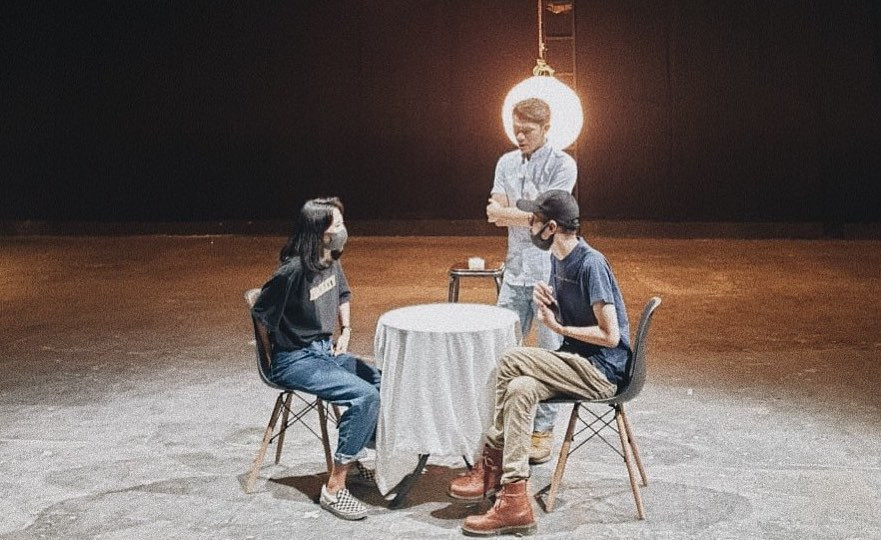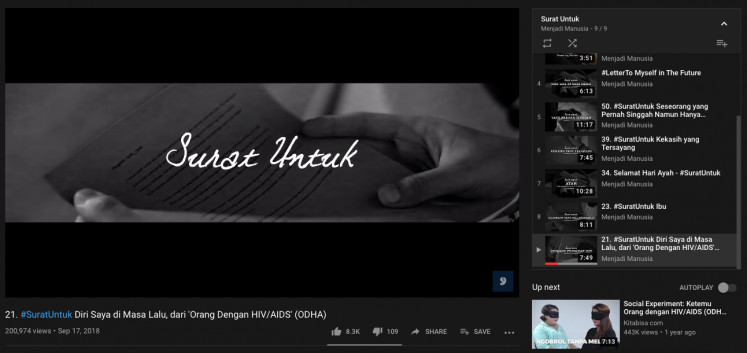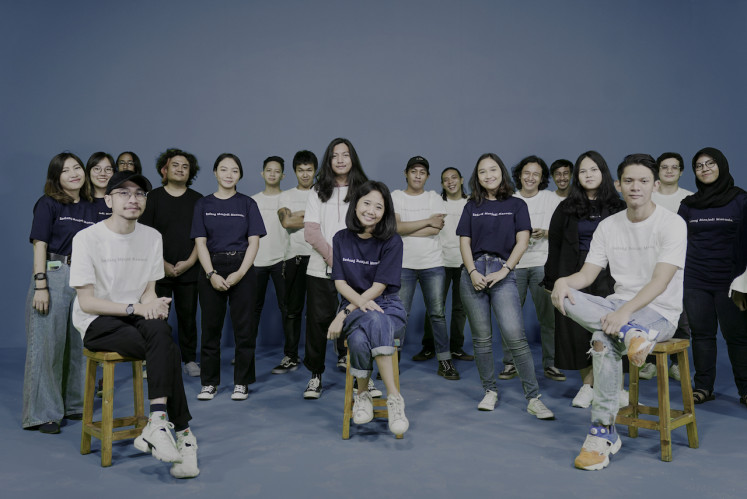Popular Reads
Top Results
Can't find what you're looking for?
View all search resultsPopular Reads
Top Results
Can't find what you're looking for?
View all search results'Menjadi Manusia' breaks the mental health taboo
The world has hit yet another grim milestone with more than 100 million coronavirus cases having been recorded around the globe. But there is another elephant in the room.
Change text size
Gift Premium Articles
to Anyone
T
he coronavirus pandemic and its socioeconomic consequences is fertile ground for various mental health issues among the population.
A report from the Indonesian Clinical Psychologists Association says that more than 14,000 people received treatment for disorders linked to learning difficulties, anxiety and depression from April to August last year.
A self-examination study conducted during the same period by the Indonesian Psychiatrists Association found that 57.6 percent of the participants were identified as having symptoms of depression and 58.9 percent as having suicidal or self-harm thoughts.
In a culture where being open about living with mental illness is still considered taboo as it may lead to stigma and discrimination, the numbers may just be the tip of the iceberg.
“We’re never taught to share our vulnerabilities. The most common response whenever people talk about their problems is ‘you should instead count your blessings’ and particularly for men they are judged as ‘unmanly’,” said Adam Abednego in a video interview on Oct. 21.
“Creating a safe place for them to talk about it has become mandatory because just talking about it is the exercise regimen to maintain mental health,” he added.
Adam is part of the Menjadi Manusia (Being Human) initiative, an Ambassador of YouTube Creators for Change 2020. With Rhaka Ghanisatria and Levina “Vinny” Purnamadewi, the three founded the channel in 2018 as part of their effort to raise people's awareness about mental health issues.
Vinny, 25, who joined later as a content designer, said she had an early quarter-life crisis as she didn’t feel as though she fit in her work environment.
“I’m a Dutch literature graduate, love designing and at that time working at a bank. I started to question my present life and future and it affected my personal life as I was always full of anger. I didn’t seek professional help at that time because I thought it was not a problem,”
“Listening to other people’s stories and experiences, I started to think of my purpose and I wanted to help other people to get through their problems, too.”
And through the initiative, the three contacted their mutual friends with stories to tell in the hope it might inspire others.
“The purpose of Menjadi Manusia is to familiarize people with personal opinions different from theirs and to let people with mental health problems know they are not alone. We can always learn from each other,” said Adam.
Reaching out: A screengrab of 'Surat Untuk' (Letter for...) episodes in Menjadi Manusia channel on YouTube. (Courtesy of Menjadi Manusia/-)The channel features videos of people sharing their personal stories about the lowest points in their lives and what they have done to overcome them.
“From their stories, we offer new perspectives for others to learn from and to take affirmative action,” said Rhaka, who was diagnosed with ADHD in 2016 and currently combines medication and meditation to cope.
The three went through varied phases throughout their early 20s and experienced first hand the value of sharing, from which they took the inspiration to establish the channel with over 715,000 subscribers.
“We were hesitant at first, doubting that people would stay and listen to someone else’s story for 30 minutes. But we received good responses from the listeners who found the stories relate to their own,” added 25-year-old Rhaka.
When they organized their first support group meeting in December 2018, they hoped they could get 50 people to attend. No less than 250 people appeared.
“They preferred to come to the support group because they faced emotional walls when they talked to friends and family about their problems,” Adam said.
The community has grown to become Teman Manusia (Human Friends) with more than 1,700 members nationwide who check on each other through regular virtual meetings during the pandemic.
The community also inspired the launch of Surat Untuk (Letter for…), a video series in which the Menjadi Manusia team read the letters written by the community members.
“In one episode, we read a letter from someone with HIV in Solo, who agreed to allow listeners to contact them. In two weeks after its release, the video had gathered over 100 people with HIV nationwide,” said Rhaka.
“It’s one of the major achievements from our initiative and the reason we started this and will keep going.”
Peer-to-peer: The Menjadi Manusia cofounders (sitting, from left) Adam Abednego, Levina Purnamadewi, Rakha Ghanisatria, and the team provide video content to raise people's awareness about mental health issues. (Courtesy of Menjadi Manusia/-)In a separate email interview with psychotherapist Heriani of Cipto Mangunkusumo General Hospital (RSCM) in Jakarta, she said she also applied peer-to-peer support for her patients to maintain their mental health resilience.
“Other people, even [mental health] professionals, may show empathy but could not really understand what they are going through. Often at the start of therapy, patients worry that the doctors or therapists will judge them or laugh at their problems. Others think they are the only person having such issues, refusing to take medication or have therapy,” she explained.
“Peers, especially those who have overcome difficult times, could provide others insights and hopes by sharing tips on how to get through it [...] a living proof that there are people who have been able to return to society,” Heriani added.
The Menjadi Manusia team also realized that many people had self-diagnosed and credited themselves with mental health problems.
Such a situation prompted them to launch a campaign called #AkarJiwaManusia, involving mental health professionals and public figures, who encourage people to have themselves clinically diagnosed and to take further treatment when necessary.
Their plan to have a physically safe place for people with troubled hearts had to be pushed back due to the pandemic, but it would not be the end of their journey.
“We chose to use a comma as our logo to remind us that being a true human being is an endless process,” said Rhaka.
“Our final goal is to see Indonesian people become more open-minded in accepting differences and mental health issues” (ste)













